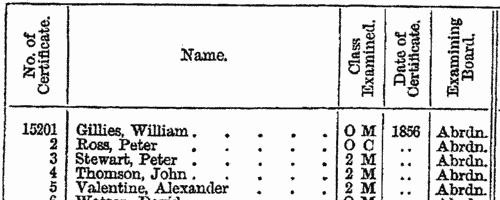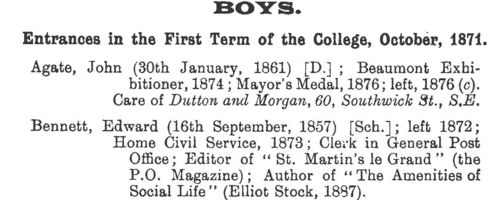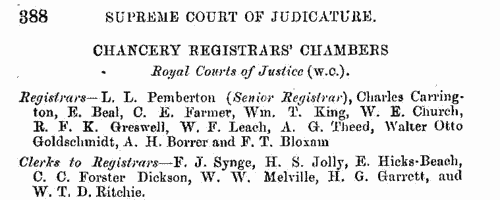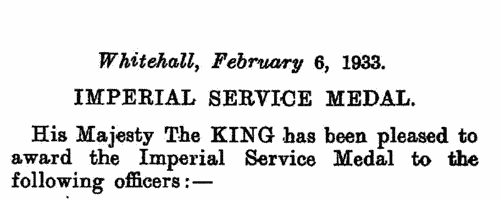Charrosin Surname Ancestry ResultsOur indexes 1000-1999 include entries for the spelling 'charrosin'. In the period you have requested, we have the following 7 records (displaying 1 to 7): Buy all | | | Get all 7 records to view, to save and print for £38.00 |
These sample scans are from the original record. You will get scans of the full pages or articles where the surname you searched for has been found. Your web browser may prevent the sample windows from opening; in this case please change your browser settings to allow pop-up windows from this site. Merchant Seamen (1835-1844)
At this period, the foreign trade of ships plying to and from the British isles involved about 150,000 men on 15,000 ships; and the coasting trade about a quarter as many more. A large proportion of the seamen on these ships were British subjects, and so liable to be pressed for service in the Royal Navy; but there was no general register by which to identify them, so in 1835 parliament passed a Merchant Seamen's Registration Bill. Under this act a large register of British seamen was compiled, based on ships' crew lists gathered in British and Irish ports, and passed up to the registry in London. A parliamentary committee decided that the system devised did not answer the original problem, and the register was abandoned after less than two years: the system was then restarted in this form, with a systematic attempt to attribute the seamen's (ticket) numbers, and to record successive voyages. The register records the number assigned to each man; his name; age; birthplace; quality (S = seaman, &c.); and the name and official number of his ship, with the date of the crew list (usually at the end of a voyage). Most of the men recorded were born in the British Isles, but not all. The system was still very cumbersome, because the names were amassed merely under the first two letters of surname; an attempt was made to separate out namesakes by giving the first instance of a name (a), the second (b), and so on. In this volume the register is restarted from 1840 onwards, with the mariner's previous number (if any) being entered in the column after his birthplace. In the event of it becoming known that a man had died during the course of a voyage, that information is written across the remaining empty columns. This volume (BT 112/12) covers mariners whose surnames start with Ce (and McCe), Ch (and McCh) and a handful with Ci.
CHARROSIN. Cost: £8.00.  | Sample scan, click to enlarge

| Cinque Port Pilots
(1857)
The Mercantile Navy List and Annual Appendage to the Commercial Code of Signals for All Nations, edited by J. H. Brown, was published By Authority in 1857. It includes this list of Pilots at the Cinque Ports. From Dungeness to Gravesend, and vice versa. The sample scan is from the main list of masters and pilots.CHARROSIN. Cost: £4.00.  | Sample scan, click to enlarge

| East Kent Registered Electors: Dover District
(1865)
The poll for two knights of the shire to represent the Eastern Division of the county of Kent in parliament was taken 18 July 1865, the candidates being Sir Edward Cholmeley Dering, bart., (D), Sir Brook William Bridges, bart., (B), and Sir Norton Joseph Knatchbull, bart., (K). This poll book lists all registered electors, whether they voted or not, by electoral district (Ashford, Canterbury, Dover, Faversham, Hythe, Margate, Ramsgate, Romney, Sandwich, Sheerness, Sittingbourne, Whitstable and Wingham) and then by township or parish within which lay the property whereby the electors had qualified. The lefthand column gives sequential number in the whole volume; then follows the elector's full name, surname first, and his address (often elsewhere); and on the righthand side for whom he voted. When the elector was qualified in duplicate the vote is recorded opposite to the number upon which he claimed to vote at the polling booth, and wherever his name occurs elsewhere a reference is made, immediately after the address, to the number where his vote is recorded, with the initials of the candidates for whom he voted. Duplicate voters who were dead at the time of the election, or did not vote, are printed in italics to signify that they did not vote, or are stated to be dead once only; and wherever the names of such electors occur elsewhere references are made to the numbers where alone they are reckoned in the abstract of the poll as dead or not voting. Whenever a number only, without any other reference, follows the address, it denotes that at the number referred to, the elector is entered as not voting. In addition, at the end of each district there is this list of persons whom had claimed and were registered to vote in the district, in which their places of abode were situate, or who were not resident in the county of Kent.CHARROSIN. Cost: £6.00.  | Sample scan, click to enlarge

| East Kent Registered Electors: Whitstable
(1865)
The poll for two knights of the shire to represent the Eastern Division of the county of Kent in parliament was taken 18 July 1865, the candidates being Sir Edward Cholmeley Dering, bart., (D), Sir Brook William Bridges, bart., (B), and Sir Norton Joseph Knatchbull, bart., (K). This poll book lists all registered electors, whether they voted or not, by electoral district (Ashford, Canterbury, Dover, Faversham, Hythe, Margate, Ramsgate, Romney, Sandwich, Sheerness, Sittingbourne, Whitstable and Wingham) and then by township or parish within which lay the property whereby the electors had qualified. The lefthand column gives sequential number in the whole volume; then follows the elector's full name, surname first, and his address (often elsewhere); and on the righthand side for whom he voted. When the elector was qualified in duplicate the vote is recorded opposite to the number upon which he claimed to vote at the polling booth, and wherever his name occurs elsewhere a reference is made, immediately after the address, to the number where his vote is recorded, with the initials of the candidates for whom he voted. Duplicate voters who were dead at the time of the election, or did not vote, are printed in italics to signify that they did not vote, or are stated to be dead once only; and wherever the names of such electors occur elsewhere references are made to the numbers where alone they are reckoned in the abstract of the poll as dead or not voting. Whenever a number only, without any other reference, follows the address, it denotes that at the number referred to, the elector is entered as not voting. CHARROSIN. Cost: £6.00.  | Sample scan, click to enlarge

| Boys entering Dover College
(1882)
The second edition of the Dover College Register, edited by William Stevens Lee, lists all boys entering the school from its opening in 1871 to the date of publication in 1899. The boys are listed alphabetically by term of entry, surname and full christian names. A double dagger after the name indicates a school prefect. Next comes the year or date of birth, then abbreviations indicating house - [D] day boy; [Sch.] School House; [Sp.] Sparke's House; [St.] Steedman's House; [W.] Walters' from 1881 to 1886, Williams' from 2nd term 1890 to 3rd term 1898; [L.] Littlewood's (the same house as Walters') fom 3rd term 1886 to 1st term 1890. From 3rd term of 1892 onwards the names were changed to [S.] School House; [P.] Priory House (was Sparke's); [M.] St Martin's (was Williams'). Moreover, in January 1893 the Junior School was established at West Mount, and from then onwards [J] indicates a period there. Next come distinctions gained in the school, exhibitions, &c., and athletic distinctions, such as XI for membership of the school cricket eleven, XV for the school football team, with years; then date of leaving; distinctions gained since leaving; and present address (where known) as of 1899. Despite this attempt at comprehensive coverage, the materials to hand for compiling the register were often lacking: at worst, in the early years, there are a handful of entries where only the surname is given. Equally, other entries are detailed and comprehensive. CHARROSIN. Cost: £4.00.  | Sample scan, click to enlarge

| Civil Servants and Office Holders
(1907)
The Imperial Calendar gives lists of officials and office-holders throughout England, Wales, Scotland and Ireland
CHARROSIN. Cost: £4.00.  | Sample scan, click to enlarge

| Imperial Service Medal
(1933)
Awards by king George V of the Imperial Service Medal to officers of the Home Civil Service. The names are arranged alphabetically by surname and christian names, with office or rank in the service. CHARROSIN. Cost: £6.00.  | Sample scan, click to enlarge

|
Research your ancestry, family history, genealogy and one-name study by direct access to original records and archives indexed by surname.
|









